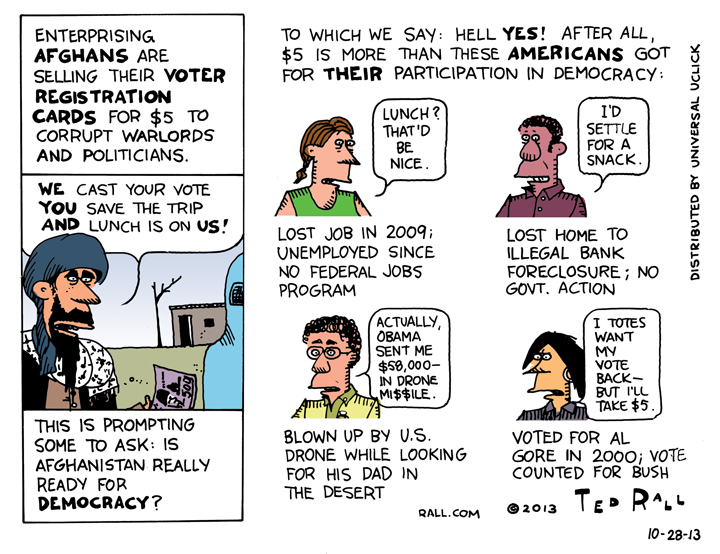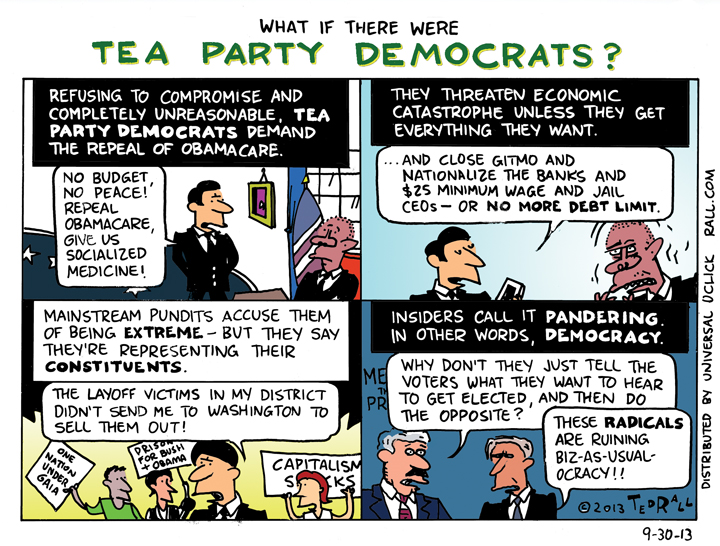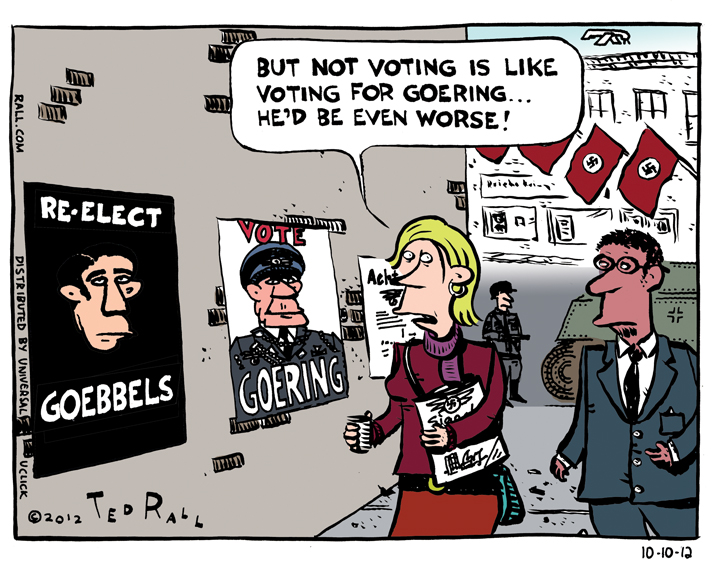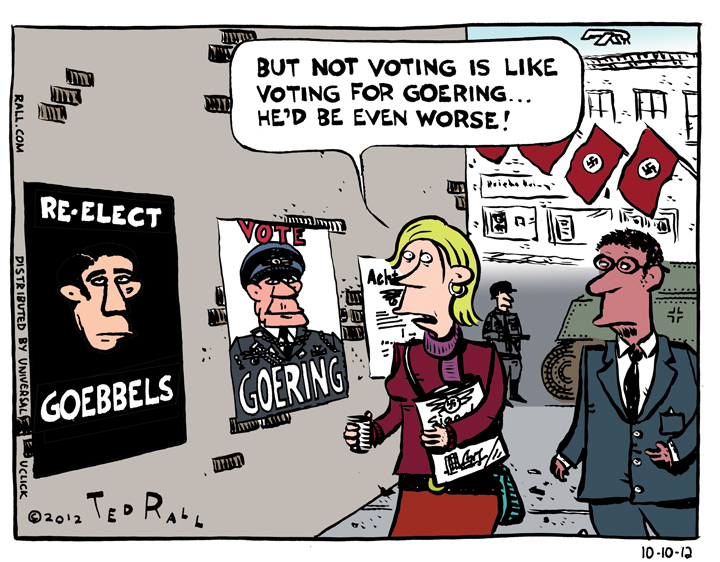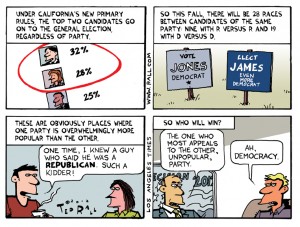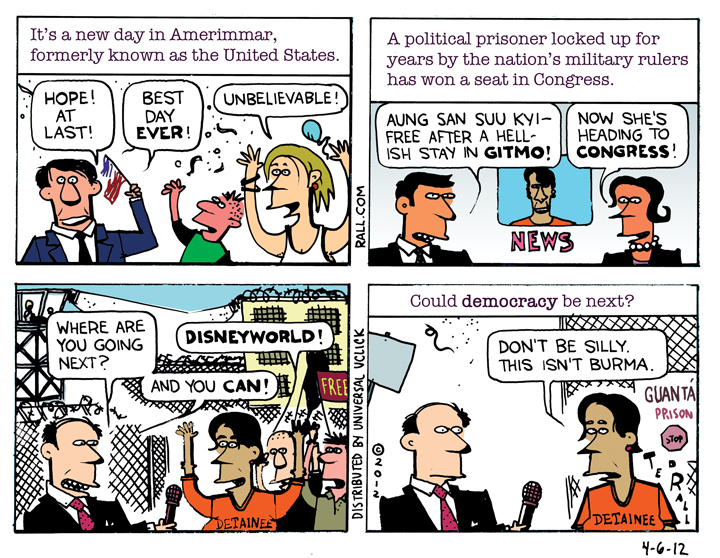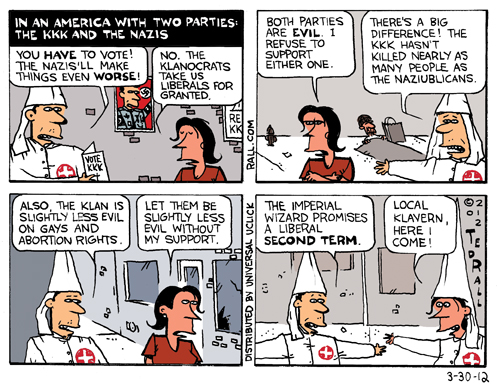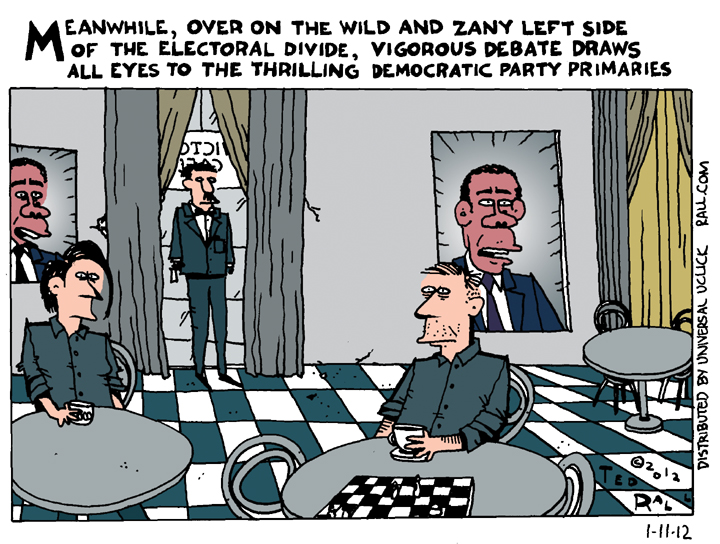Enterprising Afghans are selling their voter cards for five bucks. Which is more than many Americans get for their votes. Democracy works – in Afghanistan!
Guest Post: Sometimes You Just Gotta Let It Out
I think this lady deserves a hearing here at the Rallblog. Because it’s where we’re at right now. She’s reacting to Obama’s “Syria” speech.
Susan
http://www.youtube.com/watch?v=XunOXRiOv0E
SYNDICATED COLUMN: Is the GOP Doomed? Slightly Less than the Dems
In a Two-Party System, the Loser is Us
Stalin called bourgeois parties “the dancing bears of social democracy.” Toothless and undignified distractions, these non-movements personify the function of electoral politics—to channel the energies of the oppressed into bullshit discussions about trivia and inanities.
Uncle Joe’s hilariously inelegant phrase comes to mind these days as the corporate pundit class prattles on and on about the supposed current crise de coeur of the GOP. How, everybody is asking (if, by everybody, you mean a coupla dozen writers), can the Republican Party maintain its relevance?
Like that grammatical atrocity The Sequester (it’s a budget cut), the Republicans-could-go-extinct meme is a crisis so manufactured it hardly exists. The Party of Hoover still controls the House of Representatives. They hold us 27 state legislatures and 30 governors mansions.
You could even argue that they have the Democratic Party. The Dems of yore, after all, were big-spending liberals standing up for the little guy. FDR and LBJ wouldn’t recognize guys like Bill Clinton and Barack Obama, more worried about deficits, sucking up more to bankers and ignoring the plight of the poor and oppressed than so-called conservatives, as members of their party.
All this handwringing over the alleged danger that the GOP could fade into irrelevance—that’s mediaspeak for losing more elections—ignores the fact that Barack Obama only defeated Mitt Romney, a bizarre human being and an awful candidate—by a few percentage points. Republicans lost a few seats in the House and a pair in the Senate, but things basically remained unchanged. Not bad for a party that failed to present any new ideas beyond the usual gays suck, government should be small when the other party is in charge, and one of these days, just you wait and see, the rich really will spend some of those tax cuts here in the States.
The argument that Republicans need to reinvent themselves boils down to two factors, the first shoulder-shruggingly silly: given what a terrible job Obama did with the economy during his first term, the Republicans should have done better. No one was closer to summing this up than The New York Times the morning after Electorapocalypse 2012: “After four years in which the jobless rate never dipped below 7.8 percent, with millions of Americans still unemployed or underemployed and median household income falling, Republicans still failed to unseat President Obama and, for the second election in a row, fell short in their efforts to win control of a Senate that seemed within reach.”
A lack of crushing victory does not a defeat make.
The Paper of Record, Wednesday-morning quarterbacking elections a decade or two earlier, was evidently astonished by voters’ refusal to maintain its previous practice of punishing the incumbent party for a bad economy by rewarding an opposition that offers nothing better.
The worry that Republicans really should focus on is demographics: an influx of immigration, especially by Latinos alienated by decades GOP race-baiting on illegal immigration, coupled with a seemingly long term trend among young adults toward increased liberalism on social issues like gay marriage—young adults who will of course become the older adults of the future.
“The question now facing Republicans,” Brian Montopoli of CBS News wrote in November, “is whether they shift toward the middle or instead try to appeal to growing demographic groups while staying planted firmly on the right side of the political spectrum.”
George Skelton of The Los Angeles Times quotes a “veteran political consultant” who explains why California’s GOP is pretty much doomed: “Too white, too right and too uptight,” says the consultant, a Democrat. “That’s why the Republican Party can’t come back in California.”
A cogent and witty summary. And many conservatives seem to agree. The problem for them, as it was with Romney’s failure to make the case that he couldn’t fix the economy, is that all the proposed solutions are so lame that they’re hardly worth trying.
Karl Rove, “Bush’s architect” whose crazy right-wing politics now seem positively liberal compared to the even crazier, further-right Tea Party-dominated GOP, addressed delegates to the California state Republican convention last week, making the case for tokenism: “We need to be asking for votes in the most powerful way possible, which is to have people asking for the vote who are comfortable and look like and sound like the people that we’re asking for the vote from.” In other words, Marco Rubio. Which is Spanglish for Condoleezza Rice/Colin Powell. Sorry, but minorities have become too sophisticated for that. They want candidates who stand up for them, not just those whose skin tone matches theirs on the RGB chart.
In his pamphlet “Go For the Heart: How Republicans Can Win,” David Horowitz, whose politics blend classic 1930s fascism with Reagan at his welfare-queen filthiest, argues that the Republican victories of the future rely on a combination of hope and fear, making voters feel that Republicans care about them and that liberals want to enslave them in some imaginary nanny state. The trouble is that neither argument stands a chance of getting off the ground given decades of GOP propaganda. If Republican leaders have been successful at anything, it’s that convincing Americans that, not only do they not care about them, Americans don’t deserve to be cared about, and indeed anyone who does care is evil. As the tacit support for Obama’s flawed healthcare reform plan demonstrates, however, people really do want the government to care about them, at least to some extent. If anything, they’d like a little more nannying (in the form of a public option).
Many conservatives suggest downplaying the GOP’s stands on social issues because they aren’t popular. Some say they should be changed entirely. Others imagine a mishmash of social liberalism or at least libertarianism and fiscal conservatism.
The real reason that all of this is interesting is that it reveals the muddleheaded mess that characterizes political thought at this, a crucial juncture in the late final crisis of late stage capitalism in America. A successful political party, whether a genuine movement or a dancing bear of bourgeois electoral democracy, requires a consistent and coherent ideology. It isn’t enough to cobble together a laundry list of poll-tested positions on issues past and present. You have to put forth a way of thinking about the world that allows anyone to predict with a high degree of accuracy how your party would respond to the problems, challenges and controversies of the future, to events that are completely impossible to imagine today.
The Republicans aren’t anywhere close to achieving a coherent—much less popularly appealing—ideology.
On the other hand, neither are the Democrats.
(Ted Rall’s website is tedrall.com. His book “After We Kill You, We Will Welcome You Back As Honored Guests: Unembedded in Afghanistan” will be released in November by Farrar, Straus & Giroux.)
COPYRIGHT 2013 TED RALL
Like Voting for Goebbels
The two-party trap: Voters are asked to choose between two candidates. Both are unpalatable. Neither represents their interests. But they’re convinced to participate in the system with the argument that, if they don’t vote for the slight-least-awful option, the slight-worst one will win and make things worse.
Like Voting for Goebbels
The two-party trap: Voters are asked to choose between two candidates. Both are unpalatable. Neither represents their interests. But they’re convinced to participate in the system with the argument that, if they don’t vote for the slight-least-awful option, the slight-worst one will win and make things worse.
Los Angeles Times Cartoon: Two Democrats, Both Running as Republicans
I draw cartoons for The Los Angeles Times about issues related to California and the Southland (metro Los Angeles).
This week: Under new primary rules in California, the top two winners in a race go on to the general election, regardless of their party. Now the perverse result is that candidates of party A, which is overwhelmingly popular in their districts, must appeal to party B voters in order to win.

